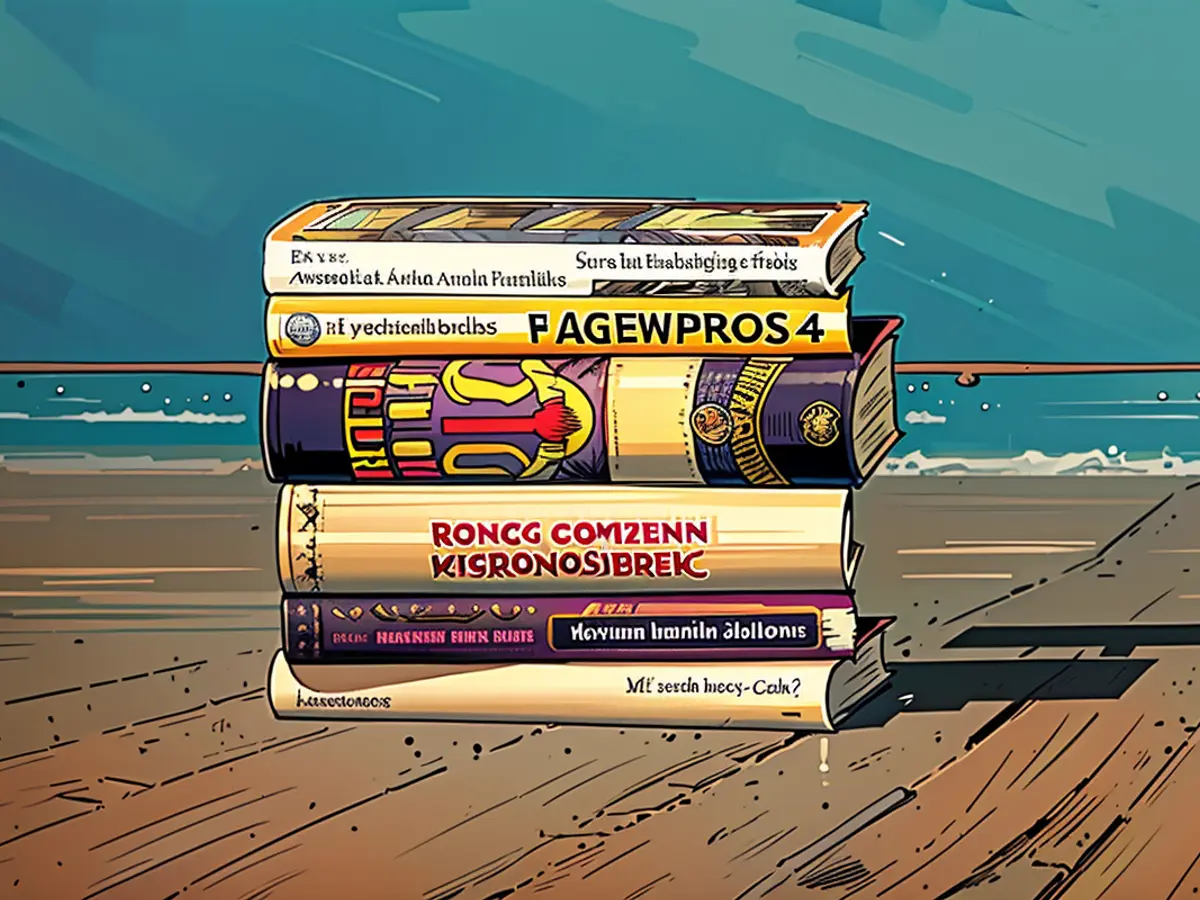Six contenders vie for the Literary Award, in this context.
This year, six novels have made the cut for the German Book Prize shortlist. The contenders include works by Clemens Meyer and Iris Wolff, among others. The victor, who will receive a hefty 25,000 euros, will be announced on October 14.
The lineup for this esteemed award comprises six novels that delve into modern history, conflict, love, and more. Nominated authors include Martina Hefter, Maren Kames, Clemens Meyer, Ronya Othmann, Markus Thielemann, and Iris Wolff. The jury unveiled the awaited shortlist in Frankfurt, with four women and two men vying for the prize.
The prize is typically awarded the day before the Frankfurt Book Fair kicks off. The comprehensive 20-strong longlist was released in August.
Natascha Freundel, the jury spokesperson, shared her thoughts: "The books shortlisted for the German Book Prize 2024 exhibit the high and low points of our recent history in creative ways, transcend narrative limitations, and offer compelling literary experiences." Each novel offers a unique blend of style and content.
Debut novels absent this time
Regrettably, debut novels are no longer featured on the shortlist, despite three making the longlist. Some recurring authors have managed to secure a spot. Notable among them is Clemens Meyer, whose novel "Im Stein" was previously recognized for the German Book Prize. He garnered the Leipzig Book Fair Prize for his collection "Die Nacht, die Lichter." His newest work, "Die Projektoren," delves into the wars of the 1990s in former Yugoslavia and the Carl May films shot there in the 1960s.
The jury praised "Die Projektoren," stating, "The book delights in challenging its readers, smothering them with its abundance of material."
Iris Wolff's "Lichtungen" transports the reader to the brink of the 20th century in Europe as the Iron Curtain falls. The central characters, much like the author, hail from Transylvania, Romania, and navigate the changes in vastly differing ways.
"With immense sensibility and refined skill, this coming-of-age tale and love story is narrated in reverse, highlighting the fractures in the two life trajectories and solidifying the figures in their specific locations and landscapes," the jury remarks.
Ronya Othmann's "Vierundsiebzig" focuses on the genocide against the Yazidis, guided by the atrocities committed by the Islamic State terror organization. Othmann skilfully fuses various genres, such as travel reports, court proceedings, historical essays, and autobiography.
"She tours the massacre sites, refugee camps, memorials, providing a platform to the survivors who narrowly escaped the murderous rampage of IS," the jury notes.
Markus Thielemann's second novel, "Von Norden rollt ein Donner," confronts a largely forgotten concentration camp as well as other themes. The main character is 19-year-old Jannes, who herds sheep through Luneburg Heath as per her ancestors' tradition.
"Thielemann crafts a dense, atmospherically gripping and linguistically powerful anti-home novel where the past's spirits haunt the idyllic Luneburg Heath," the jury explains.
'Hasenprosa' as literary motif
Maren Kames' "Hasenprosa" is an eccentric literary saga featuring a rabbit companion that defies norms as a blend of an anarchist and a skimpy bookkeeper. The whimsical adventure can't help but touch viewers' hearts, leaving them tickled, rejuvenated, and amazed.
"It's this unconventional journey that manages to nestle within your soul, eliciting laughter, excitement, and affection."
In "Hey guten Morgen, wie geht es dir?", Martina Hefter shares the tale of Juni, a performance artist, who navigates her world through social media whilst developing an unusual connection with an online scam artist seeking her money.
"Hefter masterfully depicts Juni's experiences: candid and insightful, insightful and unaffected, tender yet unsentimental."
20th Celebration
Overshadowing its 20th anniversary, the prestigious German-language literary award is being awarded this year. In total, the seven-person jury evaluated 197 novels from Germany, Austria, and Switzerland. The nominated titles have been published or are scheduled for publication in October 2023.
The award is sponsored by the Foundation for Book Culture and Reading Promotion of the German Book Trade Association and includes a total prize of 37,500 euros: the winner receives 25,000 euros, while the other shortlisted authors each receive 2,500 euros. In 2023, Tonio Schachinger, an Austrian author, was honored for his novel "Echtzeitalter."
Despite debut novels being excluded from the shortlist, they managed to secure spots on the longlist this year. Regrettably, only recurring authors like Clemens Meyer, whose novel "Die Projektoren" delves into the wars of the 1990s in former Yugoslavia, made the cut.
The unique blend of styles and contents in the works shortlisted for the German Book Prize, such as Iris Wolff's "Lichtungen," offer truly compelling literary experiences.






